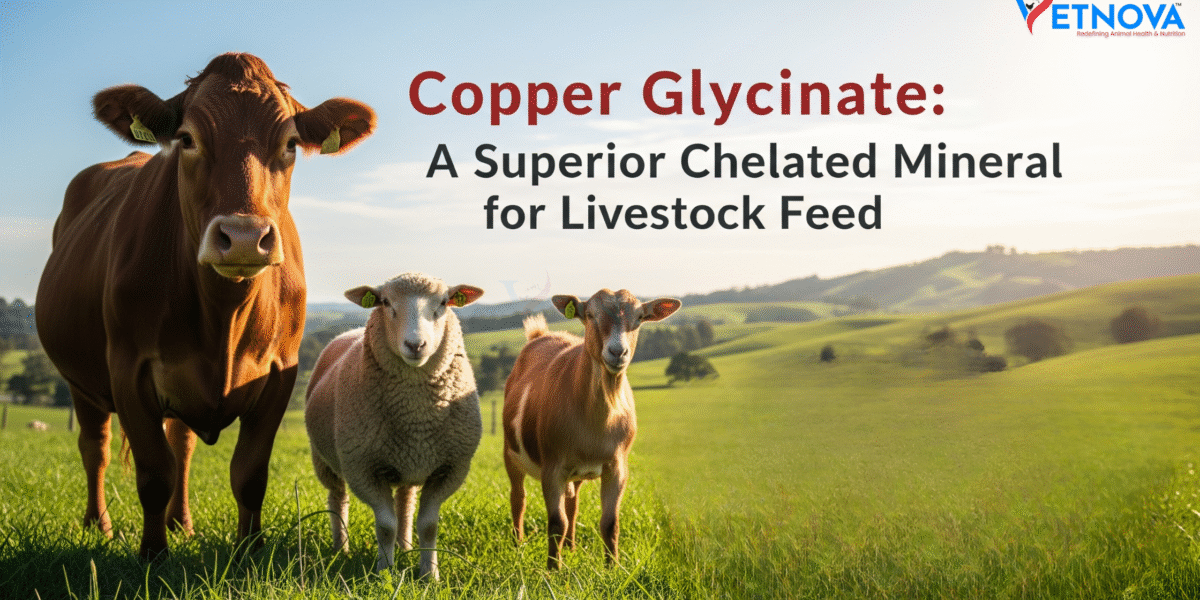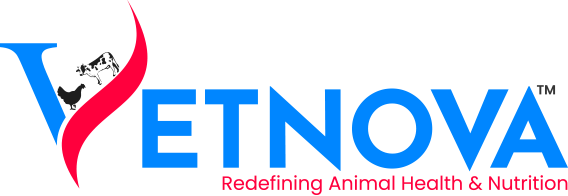Copper Glycinate Uses: A Complete Guide for Animal Nutrition
Trace minerals play a vital role in maintaining animal health, productivity, and reproduction. Among them, copper is one of the most essential elements. However, the form in which copper is supplemented greatly influences its effectiveness. In recent years, copper glycinate has gained attention as a superior choice for livestock nutrition.
This blog explores copper glycinate uses, its benefits for cattle, goats, and sheep, and how it compares to other copper supplements.

What is Copper Glycinate?
Copper glycinate is a chelated mineral, meaning copper is bound to the amino acid glycine. This bond makes the mineral more stable and easier for the body to absorb compared to inorganic copper salts such as copper sulphate or copper oxide.
Chelation improves bioavailability, reduces mineral interactions in the gut, and minimizes wastage. As a result, animals receive a consistent supply of copper for better growth and productivity.
Why Copper Matters in Animal Nutrition?
Copper is required in small amounts but is indispensable for:
- Haemoglobin synthesis (oxygen transport in blood)
- Enzyme activity (metabolism and energy production)
- Immune system strength
- Wool and hair pigmentation
- Fertility and reproductive health
- Bone and connective tissue development
A deficiency of copper can lead to anemia, poor growth, faded coat color, lowered fertility, and weak immune defense. This makes supplementation essential in regions where soils and forages are naturally low in copper.
Copper Glycinate Uses in Livestock Feeding
- Improving Mineral Absorption:
The chelated form ensures better absorption than inorganic salts. Animals can utilize copper glycinate efficiently, which prevents deficiencies and supports overall health. - Supporting Growth and Productivity:
Consistent copper supply enhances growth rates, feed conversion, and energy metabolism in livestock. - Strengthening Immunity:
Copper glycinate helps animals fight infections by supporting enzyme systems that protect cells from oxidative stress. - Enhancing Reproductive Health:
Adequate copper improves fertility, conception rates, and overall reproductive performance. - Improving Coat and Wool Quality:
For sheep, copper plays a role in wool strength and pigmentation, while in cattle and goats it supports a healthy coat and skin.
Copper Glycinate Benefits Compared to Inorganic Copper:
- Higher Bioavailability: More copper is absorbed in the intestine.
Lower Antagonism: Less interference from other minerals like zinc, iron, and molybdenum. - Better Stability: Chelated copper is stable in feed and less reactive.
Reduced Toxicity Risk: Controlled absorption reduces the chance of copper accumulation.
Thus, the copper glycinate benefits extend beyond meeting basic needs—they support long-term health and productivity. Copper glycinate is just one example of the many chelated minerals that provide superior absorption and health benefits. To explore the complete role of chelated mineral mixtures in animal nutrition, read our detailed guide. Know more.
Copper Supplements: Options and Limitations:
There are different types of copper supplements used in animal feeds:
- Copper Sulphate – Common but highly reactive; may cause digestive irritation.
- Copper Oxide – Poorly absorbed; often used in slow-release forms.
- Copper Glycinate – Highly bioavailable, safe, and effective.
Among these, copper glycinate is increasingly preferred for its superior efficiency.
Copper Supplements for Cattle
Cattle often face copper deficiency due to antagonists like molybdenum and sulphur in feed. Copper supplements for cattle, especially in chelated forms, help improve fertility, milk production, coat color, and disease resistance.
Copper Supplement for Goats
Goats are prone to copper deficiency, which can cause faded coats, reduced fertility, and stunted growth. Providing a copper supplement for goats in chelated form ensures steady mineral availability and prevents deficiency-related issues.
Copper Supplement for Sheep
Sheep have a narrow margin between copper deficiency and toxicity. This makes supplementation tricky. A copper supplement for sheep in chelated form allows safer, controlled absorption and reduces the risk of copper poisoning.
Copper Supplement for Poultry
Copper is an essential trace mineral in the poultry diet. It plays a critical role in supporting immune function, antioxidant defence, bone strength, iron metabolism, haemoglobin synthesis, erythrocyte production etc., subsequently leading to optimal growth and productive performance in poultry.
Copper Supplement for Fish
Copper is an essential trace mineral for fish, functioning as a co-factor for crucial enzymes involved in bone formation, iron metabolism (haemoglobin synthesis), immune function, antioxidant defence, and nervous system health. Copper is vital for overall growth, development, and metabolic processes.
Click here to know more.
Dosage and Safety Considerations
- Always follow veterinary guidance for mineral supplementation.
- Over-supplementation can lead to copper toxicity, especially in sheep.
- Chelated forms like copper glycinate lower the risk of imbalance but still require careful dosing.
Choosing the Right Copper Supplement:
When selecting copper sources, consider:
- Bioavailability and absorption rate.
- Interaction with other minerals in feed.
- Animal species and their tolerance levels.
- Long-term health and productivity goals.
In most cases, copper glycinate stands out as the preferred choice for balanced, effective supplementation.
Future of Chelated Minerals in Animal Nutrition
With growing focus on sustainable livestock production, chelated minerals like copper glycinate are expected to become standard in modern feed formulations. They not only improve animal performance but also reduce mineral wastage and environmental impact.
Conclusion
Copper is essential for animal health, but its effectiveness depends on the form of supplementation. Copper glycinate uses in livestock nutrition ensure higher bioavailability, stronger immunity, better growth, and improved fertility.
Compared to inorganic sources, copper glycinate offers superior benefits for cattle, goats, and sheep, poultry and aqua making it a safer and more efficient option. When used correctly, it supports long-term animal health and productivity—proving that the right form of mineral supplementation makes all the difference.
Yes, many chelated minerals, including copper glycinate, are approved for use in organic livestock production depending on regional certification standards. Farmers should check with their local certifying body before use.
Both are chelated minerals, but copper glycinate is bound to glycine (a simple amino acid) while copper proteinate is bound to larger protein fragments. Copper glycinate is often more consistent in absorption due to its simpler structure.
Yes, copper glycinate is generally compatible with other minerals in feed. Its chelated form reduces antagonistic reactions with elements like zinc or iron, which often interfere with inorganic copper absorption.
Visible improvements in coat color, growth, and overall animal condition may be noticed within a few weeks, though reproductive and immunity benefits may take longer depending on the herd’s health status.
Yes, when used in proper dosage under veterinary supervision, copper glycinate can safely be given to calves, kids, and lambs to support early growth and immunity.
